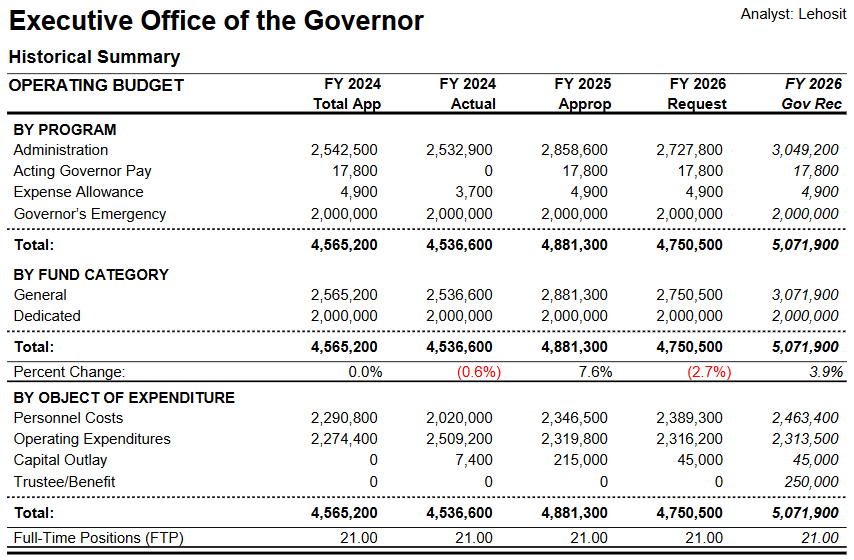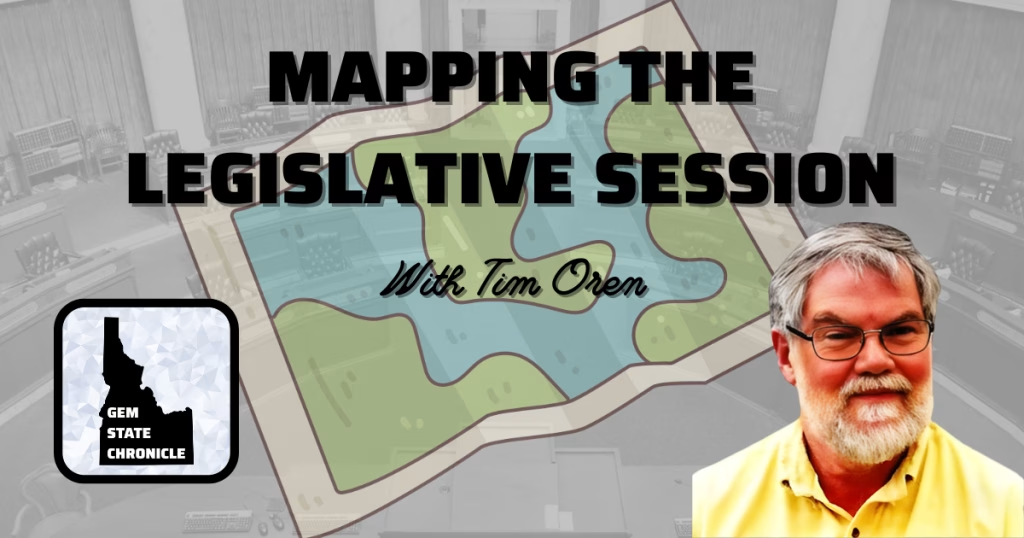When the Joint Finance-Appropriations Committee (JFAC) met on Tuesday morning, members reviewed the budget for the Executive Office of the Governor. The budget was presented by Christopher Lehosit, an analyst for the Legislative Services Office, and Lori Wolff, administrator of the Department of Financial Management and the governor’s budget director.
During the hearing, Rep. Josh Tanner had a question. Why did four state agencies — the Dept. of Health & Welfare, Dept. of Corrections, Dept. of Insurance, and Division of Financial Management — each make a five-figure transaction to the Executive Office of the Governor, three in August 2023 and the last in June 2024, just before the end of the fiscal year?
Rep. Tanner noted that transfers between state agencies typically include accompanying notes explaining their purpose, but these four did not.
Wolff appeared somewhat rattled by the questions and explained that the transactions were reimbursements for employees in the governor’s office who had worked in those agencies. She added that this process was implemented in the 1990s, and included her own time
Sen. Jim Woodward suggested that JFAC’s time was too valuable to be spent examining single line items, noting that interested citizens could review the Transparent Idaho website on their own time. Rep. Tanner countered that these transactions do not appear on Transparent Idaho, which is why he was asking about them during the hearing.
Watch the entire exchange here:
As you can see in the legislative budget book, the Executive Office came in $28,600 under budget in fiscal year 2024. That’s great! However, this means that had the Office not transferred $50,000 from the Department of Financial Management in June 2024, as Rep. Tanner pointed out, it would have actually been over budget instead. For reference, Idaho’s fiscal year ends on June 30.

Wolff said during the hearing that none of these transactions were done with the intent to hide anything or offset budgets. She said this process of transfers — called a 10P process — was implemented in 1999 following committee recommendations, and enables state agencies to share personnel costs when appropriate.
However, there were a few other anomalies that caught the attention of JFAC members that morning. For instance, the Legislature appropriated $215,000 to implement a constituent management application via Salesforce. Sen. Phil Hart questioned Lehosit about it and later followed up with Wolff during the hearing. Wolff stated that the Office ultimately decided not to pursue this solution and is still evaluating options. She also noted that the appropriated funds were not spent. But if that’s the case, shouldn’t the Office have come in another $215,000 under budget for fiscal year 2024? Perhaps I’m missing something; I’m still a novice with regards to state budgets.

Another item that raised concerns was a request to transfer $1.35 million to a special emergency fund originally set up during the COVID-19 pandemic, which the Legislature initially appropriated $2 million for. Why would the governor need additional funds for an emergency that has passed? Where did that $1.35 million go in fiscal year 2024?

These are taxpayer dollars we’re talking about. The Legislature appropriates, and the Executive spends to carry out the directives of our lawmakers. In response to these concerns, Rep. Heather Scott presented House Bill 283 in the Ways & Means Committee this morning. The text of the bill is simple:
Notwithstanding any other provision of law to the contrary, the governor shall not bill other state departments or constitutional officers for personnel employed by the governor.
Rep. Steve Berch, a Democrat from Boise, seemed offended at the very idea of questioning the governor. Watch the entire exchange here:
Remember the media firestorm three years ago when then-Lt. Gov. Janice McGeachin faced a relatively small budget shortfall due to a lawsuit from the Idaho Press Club? That situation generated countless media hit pieces and political controversy. Will those same outlets take an interest in the governor’s budget now?
I’m certainly not suggesting that anyone in the Executive Office has done anything illegal or unethical. I’m simply asking questions. We the people, along with our elected representatives in the Legislature, have an inalienable right to know how our government is spending our money. Sometimes, that requires us to educate ourselves to better understand the complex accounting involved in managing a multi-billion-dollar budget. Nevertheless, quis custodiet ipsos custodes? As citizens of a republic, it is our responsibility to keep a watchful eye on our government.
Restoring constitutional governance at both the state and national levels is an ongoing effort, and it begins with understanding and maintaining the proper balance of power in government. It is the Legislature’s responsibility not only to appropriate tax dollars but also to ensure accountability for how those funds are spent.
Consider when the Department of Health & Welfare blatantly defied the Legislature in 2022 by redirecting funds appropriated for K-12 programs to pre-K programs instead. It fell to the Legislature to exercise its constitutional authority and hold those bureaucrats accountable.
Sen. C. Scott Grow, co-chair of JFAC, has often remarked that when he first joined the Legislature, the budget-setting committee seemed like little more than a rubber stamp for the governor. This is why he took the initiative to implement maintenance budgets last year and performance budgeting this year. This approach is both right and proper — constitutionally, the Legislature controls the purse, not the Executive. Rather than marching into JFAC with a list of demands, representatives of state agencies should be grateful for every penny they are allowed to take from the people of Idaho.
The people of Idaho entrust their elected representatives with the authority to levy taxes for the common good. In return, those representatives have a duty to ensure transparency and accountability in government spending. I therefore disagree with Sen. Woodward and hope our elected lawmakers will do everything within their power to hold our government accountable for how it spends the money we have entrusted to it.
Gem State Chronicle is a reader-supported publication. To receive new posts and support my work, consider becoming a free or paid subscriber.
About Brian Almon
Brian Almon is the Editor of the Gem State Chronicle. He also serves as Chairman of the District 14 Republican Party and is a trustee of the Eagle Public Library Board. He lives with his wife and five children in Eagle.













